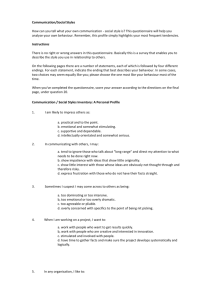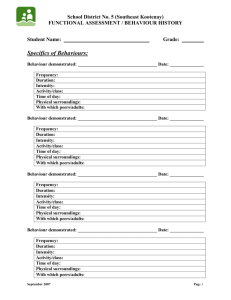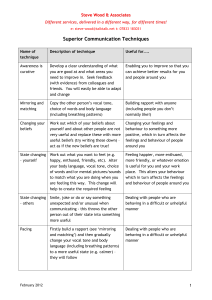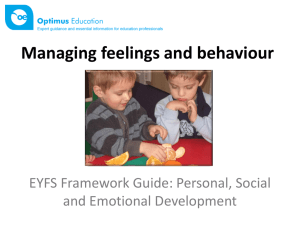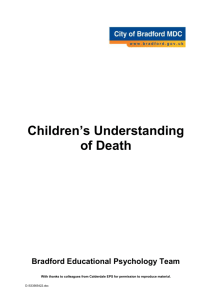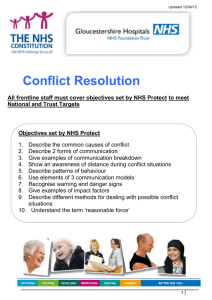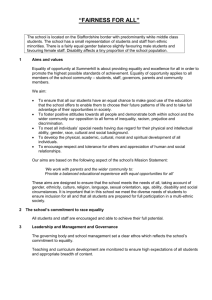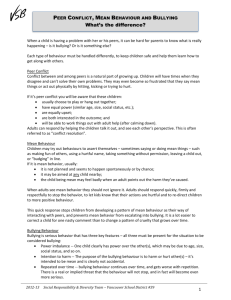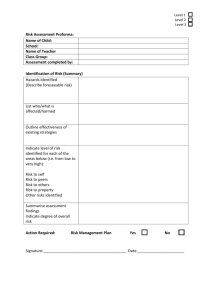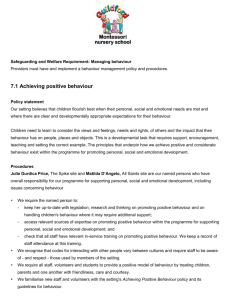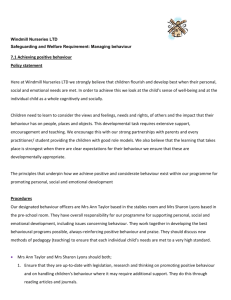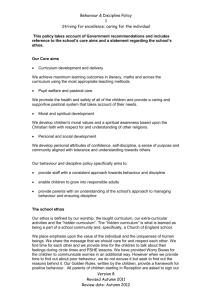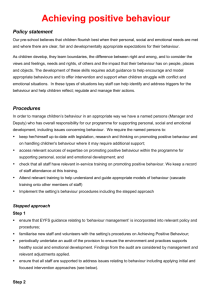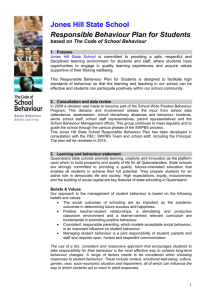National Curriculum Subject: PSHE Progression Map: Skills and
advertisement
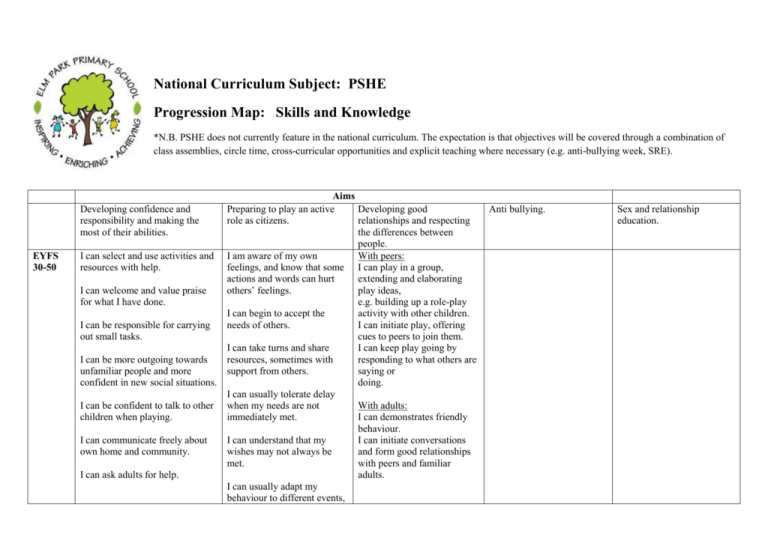
National Curriculum Subject: PSHE Progression Map: Skills and Knowledge *N.B. PSHE does not currently feature in the national curriculum. The expectation is that objectives will be covered through a combination of class assemblies, circle time, cross-curricular opportunities and explicit teaching where necessary (e.g. anti-bullying week, SRE). EYFS 30-50 Aims Developing confidence and Preparing to play an active Developing good responsibility and making the role as citizens. relationships and respecting most of their abilities. the differences between people. I can select and use activities and I am aware of my own With peers: resources with help. feelings, and know that some I can play in a group, actions and words can hurt extending and elaborating I can welcome and value praise others’ feelings. play ideas, for what I have done. e.g. building up a role-play I can begin to accept the activity with other children. I can be responsible for carrying needs of others. I can initiate play, offering out small tasks. cues to peers to join them. I can take turns and share I can keep play going by I can be more outgoing towards resources, sometimes with responding to what others are unfamiliar people and more support from others. saying or confident in new social situations. doing. I can usually tolerate delay I can be confident to talk to other when my needs are not With adults: children when playing. immediately met. I can demonstrates friendly behaviour. I can communicate freely about I can understand that my I can initiate conversations own home and community. wishes may not always be and form good relationships met. with peers and familiar I can ask adults for help. adults. I can usually adapt my behaviour to different events, Anti bullying. Sex and relationship education. social situations and changes in routine. EYFS 40-60 I can describe myself in positive terms. I can talk about my abilities. I can speak to others about own my needs, wants, interests and opinions. I can understand that my own actions affect other people, for example, I become upset or try to comfort another child when I realise I have upset them. I can begin to be able to negotiate and solve problems without aggression, e.g. when someone has taken my toy. I am aware of the boundaries set, and of behavioural expectations in the setting. EYFS ELG I can try new activities. I can say why I like some activities more than others. I can speak in a familiar group. I can talk about my ideas. I can choose the resources I need for my chosen activities. I can say when I do or don’t need help. I can talk about how I and others show feelings. I can talk about my own and others’ behaviour, and its consequences. I know that some behaviour is unacceptable. I can talk about my own and others’ behaviour, and its consequences. I know that some behaviour is unacceptable. I can work as part of a group or class. With peers: I can take steps to resolve conflicts with other children, e.g. finding a compromise. With adults: I can initiate conversations, attend to and takes account of what others say. I can explain own knowledge and understanding, and ask appropriate questions of others. With peers: I can play co-operatively. I can take turns with others. I can take account of another person’s ideas about how to organise an activity. I can show sensitivity to others’ needs and feelings. With adults: I can form positive relationships with adults and other children. I can understand and follow the rules. I can adjust my behaviour to different situations. I can take changes of routine in my stride. 1 I can identify and name some feelings. I know ways of keeping clean. 2 I can share my views and opinions about fairness. I can set myself simple goals. I can make good choices about aspects of my well being. 3 I can show I value myself and other people by making positive comments. I can explain my views confidently and listen to and show respect for the view of others. 4 I know that money comes from different sources and can be used for different purposes. I can describe ways of keeping I can make real choices. I know that I belong to various groups and communities, such as family and school. I know about right and wrong, fairness and rules. I can talk about social dilemmas with others. I know values of honesty, respect and concern for others. I can investigate typical issues and problems using a range of sources to find answers to simple questions or information and advice. I know the value of tolerance for others. I can present and develop my I can explain different ways that family and friends should care for each other. I know that there are different types of teasing and bullying. I can name the main parts of the body. I can play and work with others. I can cooperate with others to take a share responsibility. I know that bullying is wrong and some ways to get help to deal with it. I can identify and respect differences between people. I know how my behaviour can affect others. I can explain how my actions have consequences for myself and others. I can describe the consequences of bullying and express way of responding to it. I know different types of relationships and how to maintain good relationships. I can resolve differences by I can recognise the I know how to maintain safe in familiar situations. ideas and views. I know the harmful aspects of household products and medicines. I can take part in decision making activities. I can reflect on my participation in citizenship activities. 5 I can identify positive ways to face new challenges. I can demonstrate how to look after and save money. I can identify some factors that affect emotional health and well being. I can make judgements and decisions to resist negative peer pressure around health and wellbeing. I know about power and authority. I can recognise the role of voluntary groups in the community. I can explain how I will develop skills for work in the future. I know some interesting concepts about rights and responsibilities. exploring alternatives and making choices. I know that there are different rights and duties and home, at school and in the community. I can develop relationships by communicating with children in other countries. consequences of anti-social and aggressive behaviour in individuals and communities. personal hygiene. I know the consequences of racism. I can discuss some of the emotional and bodily changes at puberty. I can respond to and challenge negative behaviours such as stereotyping and aggression. I know how to deal with changes in a positive way. I can show respect and tolerance towards people who are different to me. I know about a range of jobs. I know some different beliefs and values in society. I can explain how to manage the risks in different familiar situations. 6 I know commonly available drugs that are legal and illegal and the effects and risks of these. I can explain how to stay physically and emotionally healthy. I can make informed choices about my health and wellbeing I can demonstrate respect for differences between people. I can draw conclusions and justify personal views and opinions to contribute to a I can understand how to manage relationship changes positively. I can recognise difference and diversity. I can assertively challenge prejudice and discrimination. I can discuss how relationships change as people grow up. I know how babies are made. and explain reasons for my choices. I can assess the element of risk attached to making choices about health, travel, personal safety and finances. I know that I can resist negative pressure using strategies to get help, delay and show resilience. I know that future wants and needs may be met through money management and saving. I know some basic facts and laws about alcohol, tobacco and legal and illegal drugs. class debate. I can negotiate, decide and take part in responsible actions, both in school and wider community, and reflect on their participation. I can take responsibility for the needs of others as a playground mediator for younger children or buddy. I know the role of the media in presenting information to the public and appreciate that information can be interpreted in different ways. I know about democracy, government and justice. I can show understanding and empathy towards others who live their lives in different ways. I can discuss the importance of relationships to marriage, parenthood and family life. I can discuss ways that relationships change over time. I know how to negotiate within relationships.
